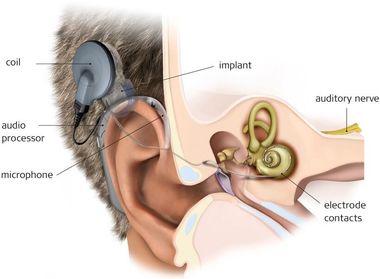Implants for Hearing Improvement
Prof. Dr. Patrick Schuler, Director of the Heidelberg ENT Department, has himself collaborated in the development of electronic hearing implants, and has extensive experience with implantations.

BoneBridge, Soundbridge, Cochlear Implants
Implants are available in cases of deafness that is not adequately treated with conventional hearing aids. With these, hearing information can be transferred through the closed skin. Examples are the BoneBridge, for cases of conductive hearing loss with well-preserved inner ear function, or the Soundbridge, for cases where a hearing aid is actually necessary but the ear canal is unsuitable because of shape or inflammation. If the perception of sound is severely impaired, cochlear implants can stimulate the auditory nerve directly. With these, good speech recognition is generally possible under good conditions.

Schedule a consultation!
If you are interested in any of these treatment methods, you are welcome to schedule a consultation at the hearing loss office hours of the Heidelberg ENT Department. A detailed diagnosis of your hearing will be carried out after a medical history and microscopic ear examination. Implant insertion is carried out with a procedure under general anesthesia during a short inpatient hospital stay. The implant is individually adjusted for you.
Outpatient Rehabilitation After Cochlear Implant
Following insertion of a cochlear implant, hearing must be practiced anew. To enable the best possible training situation, we offer outpatient therapy with audiologists, occupational therapists, audio therapists, psychologists, and physicians. Together with you we consider whether inpatient rehabilitation, when necessary, would be a consideration for you.

